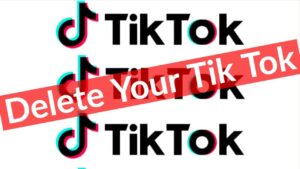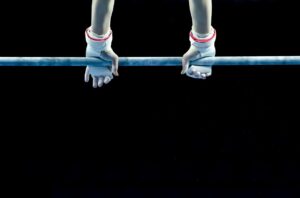Saturday night, I was at a high school grad party playing cornhole when a friend sent me a link to this article: Warning—Apple Suddenly Catches TikTok Secretly Spying On Millions Of iPhone Users. This was our exchange:

This was my third TikTok spiral of doom in the last six months. I downloaded the app last fall, deleted it over Christmas Break, then wrote a blog post about it this spring—China and the TikTok Problem.
I feel like I’m in the unique position of being able to understand just how pervasive and addictive TikTok is from the teen/young adult perspective, but I also have the grouchy old guy perspective who cares about boring adult things like invasion of privacy and national security. So, here I am, telling you what I think..
The next day, there was another grad party, and at one point I found myself eating dinner at a table with all high schoolers and recent grads. TikTok came up, *somehow* (it was me; I’m “somehow”), but I was highly reluctant to commit to a serious conversation about it, partially because I had a lot of strong feelings I hadn’t fully processed/researched, and partly because I figured they didn’t actually want to hear a old person scold them about something they love during a party. I may have underestimated them.
Not only did they genuinely want to hear what I thought, a large group of them deleted the app from their phones during the conversation (and several others never had it in the first place). Who knows how long that lasted (I’m looking at you, Chloe and Elana), but on the whole it was a reassuring conversation. I’m writing this post now to double-down on the points I made then.
I’m a private person. I pay for a VPN so it’s more difficult to hack or track me online, I use DuckDuckGo as a search engine so Google doesn’t have access to everything I type into the search bar, and Brave is my browser of choice. Those are the minimum steps you need to take if you want to retain your dignity and safety online, in my opinion, but I don’t expect everyone to feel the same way. I do those things simply because I loathe the idea of being spied on and taken advantage of, even if I’m not doing anything “wrong”. That’s not the only area my preference for privacy shows up, I also almost never talk about my personal life in class/at work and I hold myself to a strict “no gossip” standard—if someone ever prefaces giving me information with “you can’t tell anyone else about this, but”, I take offense. Not telling anyone anything is my default setting; divulging is the exception to the rule.
For me, the most depressing possible response to “This app is spying on you”, or “Your phone is listening to you”, is not “So what?” The most depressing possible response is “Good!” And I’ve heard people say that, usually students, and usually it’s unclear how serious they are. But it’s not an uncommon response. The under-23 generation seems to associate having their data stolen and sold with things like getting more targeted ads, which could be seen as a positive. From their perspective, everyone’s basic data is immediately accessible online anyway, so why should they care if one more organization has it?
What’s the worst that could happen? Unsubscribing from one more Mailchimp advertising campaign down the road? Getting ads for women’s spandex for a few months after you purchase new volleyball uniforms for the team? [true story]
The worst case scenario is challenging to explain, partially because we haven’t experienced it or seen it, yet. In some ways, personal data is valuable for the same reason why Tesla or Uber stock is valuable—not based on immediate profits, but for what might be able to be done with it later. In other ways, it’s already being weaponized in how advertising works, in headlines, in political campaigns.
The market for user data—simple things like emails, phone numbers, and date of birth—is projected to reach $274,000,000,000 (274B) by 2022. That’s yearly revenue. This information should be private property, so it shouldn’t be bought and sold without your consent, and it definitely shouldn’t be making tech companies rich while the creators of the data, the individual people, have no control over what happens to it.
This system happened by accident, because our laws cannot keep up with how fast the world is changing, especially when it comes to the internet and intellectual copyrights. If we hit the reset button right now and we drafted random citizens to write laws governing user data, no group would come up with anything close to our current system. It’s common sense that your data should be private property, but during the “Wild West” days of the internet, tech companies built their business plans around using their customer’s data for their own profit, and now that’s the precedent. It’s the equivalent of someone watching you as you go throughout your day, photographing your habits, listening to your conversations, taking notes on what you buy at the store, and then either trying to get you to give them money because of what they know about you, or selling what they know to someone else, so someone else can try to get your money. Our government is also collecting everyone’s data, so they are in no hurry to crack down on private companies.
Andrew Yang is the only “politician” I know of who is talking about this stuff, and one of his Democratic Presidential campaign platforms was privatizing data. If the default setting and legal standard is “data is private property”, then you can control what is done with it. If you don’t care about privacy, you can sell whatever aspects of your data to whatever companies you want, but then at least you are getting part of the profits, rather than everyone benefitting from your data except you. I don’t know that his plan is perfect, but I do think it’s a conversation we need to have as a country—the sooner the better. If you want to lend your support to the movement, you can give Andrew Yang your data here: The Data Dividend Project. I did.
Your phone’s microphone is always on, recording. Your smart home devices probably know more about your family than you do. The push for smart watches is based in getting that microphone out of your pocket and strapped to your body. Just a few years ago, this would be considered unthinkably dystopian, but here we are, getting more used to it every day. The tyranny of convenience.
I’m not a Luddite, nor am I trying to get rid of your “smart” devices. I am trying to get you to reconsider TikTok.
If you imagine all of the apps and devices that track and store your information as people in the bushes outside your window with binoculars, it definitely gets a bit more creepy. You recognize some of them, which helps. Now imagine one of those spies is plotting your downfall. Trying to find something they can use against you, to ruin your life. If you could get rid of that person, wouldn’t you? Delete TikTok.
I’m not saying that Facebook or Google or Amazon are outside your window for your protection, or because they care about you in the slightest, but at least they can be held accountable, in theory. At least they have a vested economic interest in seeing the U.S. continue to survive and thrive. Ideally, they are only there with your permission and you know what they want from you and why, but let’s take this one step at a time.
If you’re wondering why I haven’t said much about TikTok itself yet, it’s because much of it is said and linked to in this article: TikTok: Beneath Its Fun Exterior Lies A Sinister Purpose. He covers it well and has a bigger platform than I do; please read.
The U.S. Armed Forces are prohibited from using it. Reddit’s CEO called it “spyware“. Its content is censored directly by the Chinese government.
Yesterday, India banned TikTok entirely, along with 58 other Chinese apps. India is the second largest country in the world, nearly 18% of the total population and 660,000,000 (660M) TikTok downloads (the U.S. has 165M downloads), so this is no small decision. It doesn’t help that Chinese soldiers killed 20 Indian troops in a skirmish on their border two weeks ago.
India got it right: TikTok is evil
Today, the U.S. Federal Communications Commission designated China-based Huawei and ZTE Corporation as “national security risks”, saying that these multi-national telecommunication companies are masquerading as private companies but providing information to the Chinese Communist Party.
Have you had enough yet? I have more. #deleteTikTokchallenge
Yesterday, a massive story broke which claims the Chinese government is conducting mass sterilization on Muslim minorities.
The report said 80% of all new IUD placements in 2018 in China were performed in Xinjiang province, which has only 1.8% of the country’s overall population.
The measures have achieved huge drops in birth rate. Population growth in the two districts with the largest Uighur populations fell by 84% between 2015 and 2018 and even further in 2019. One Uighur region had an unprecedented near-zero population growth target for 2020, according to the report.
Uighur families that defied birth control measures would be punished by detention in the “training” facilities, the report said, citing Chinese government documents.
For the first time in his reporting, Zenz used the term “demographic campaign of genocide” to describe what is happening in the Xinjiang region — a profound allegation that he had resisted, given its legal implications for Beijing.
“I’ve been one of the strongest advocates to not use the term genocide without an adjective,” said Zenz. “However, the suppression of births is one of the criteria of literal genocide per the U.N. convention — so it’s appropriate to start to talk about this moving into an aspect of genocide.”
Meanwhile, the NBA is planning on branding its courts with #BlackLivesMatters on their scheduled return at the end of July, yet have said absolutely nothing about China since the #freeHongKong scandal only a few months ago. The NBA gets at least 10% of its revenue from China, and considers it to be their biggest area of revenue growth in coming years.
Can you imagine what the reaction would be if the U.S. was found to be conducting mass sterilization of a religious minority? It’s beyond comprehension.
Speaking of #freeHongKong, today China announced it was passing a law in Hong Kong that would restrict their citizens’ ability to protest, among other things, but the details of the law haven’t been released yet. This is bad news.
If I haven’t made it clear, the basic problem here is that the Chinese government and Chinese companies are basically the same entity. We Americans are accustomed to separating companies from governments, because that’s how our system works, but China has a different system. That’s why it’s relevant to talk about the *alleged* atrocities being committed by the Chinese government—those same people are controlling TikTok.
#deleteTikTokchallenge
Fine. You don’t care about the Uighurs, or Hong Kong. How could this affect you?
Read this:

I’m not a coder, and I didn’t “reverse-engineer” the app myself, but this is the tip of the iceberg, when it comes to what can be done with your data. One thing I know for sure is if an app on your iPhone has this kind of power, it can also access all your connected devices. It can record every keystroke on your MacBook or iPad. Even if you have no proof this app is trying to harm you, that alone should make you uncomfortable enough to start looking for alternatives.
It might be hard to imagine life without TikTok, but, trust me, we’ve been here before with Vine, and countless other examples. It will be okay. If there is a market, the good will be supplied. The best thing you can do is delete TikTok, move to Byte or the substitute of your choice (if I’m being honest, I would replace it with reading and writing and exercise and competition and real live human interaction, but I’m willing to compromise), set up camp and mark your territory, then start recruiting your friends to do the same.
What’s that? You don’t care if an app has that kind of access to your personal information? Cool, thanks for reminding me people like you exist—I’ve been waiting for you to speak up.
These apps have a great deal of power over you. They decide what is posted on their site, what is trending, and what you see. They decide how you get notifications, and when. There are human beings making these decisions carried out by the app, and humans have preferences. They want some things to happen and not others. Agendas.
I believe in free will, but I also see people getting manipulated all the time. The question isn’t “is someone trying to manipulate me?”, the question is “who is trying to manipulate me, and what do they want?” Usually they want money and power, that’s normal. What if they want to sterilize you?
Maybe you don’t have anything to hide, or anything to steal. It’s unlikely the Chinese government cares about you, specifically—you’re not special. And the data you’re giving them is just a drop in the bucket. But, if one of those spies outside your window had a bucket and wanted to drown you in it, you would probably start paying attention to each drop.
Turn off the faucet.


